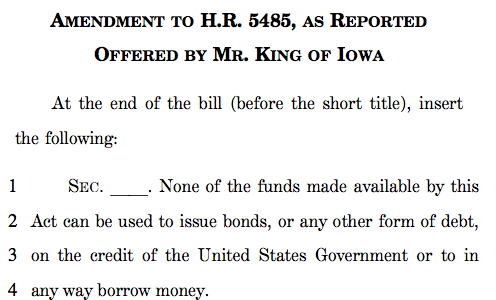The Pantheon of bad economic ideas proposed by members of the United States Congress is a crowded place. In recent years alone, bills that would result in the Treasury Department effectively defaulting on its debt and repeated attempts to pass a strict balanced budget amendment have given economists fits.
But an amendment offered by Rep. Steve King (R-Iowa) to the upcoming appropriations bill that would fund the Treasury Department may might just set the standard against which all future dubious economic proposals will be judged.
Related: Trump Says He Doesn’t Need the GOP; Republicans Might Be Okay with That
In the space of just 36 words, King proposes a restriction on the Treasury Department that would not just hogtie the U.S. government’s ability to manage its existing debt, but would at the same time create a global financial crisis.

The amendment, meant to be tacked on to the end of the “Financial Services and General Government” appropriations bill, is short and clear. It reads, “None of the funds made available by this Act can be used to issue bonds, or any other form of debt, on the credit of the United States Government or to in any way borrow money.”
To be clear, barring the Treasury Department from issuing bonds is a pretty extraordinary move. Not only does it prevent the federal government from issuing new debt -- something Republican-controlled houses of Congress have been going back-and-forth on with the Obama administration for years -- it also effectively bars Treasury from rolling over existing debt.
That’s kind of a problem, because U.S. Treasury securities are, literally, the underpinning of the global economy. The U.S. has always honored its debt, which has made Treasury securities the closest thing to a risk-free asset there is on planet Earth.
Related: Why Clinton or Trump Could Face a Stock Market Nightmare
That means that for decades, individuals, investment companies, corporations and sovereign governments have all invested in U.S. Treasury securities on the assumption that they were as safe as an investment can possibly be.
King’s plan to block the Treasury Department from issuing more debt would throw those assumptions out the window. It would also make it virtually impossible for the federal government to make good on benefits payments to veterans, retirees and others expecting promised government payments.
The proposal, according to economist Jared Bernstein, is “unbelievable.”
Bernstein, a senior fellow at the Center on Budget and Policy Priorities, compared it to a proposal by presumptive Republican presidential nominee Donald Trump that the U.S. just refuse to pay its debts until its creditors offer more lenient terms.
“This is up there with Trump’s idea to default on the debt,” Bernstein wrote in an email exchange. “Though it’s way crazier (and would also be a default, as we couldn’t borrow to pay holders of existing Treasury debt).
“Before we even think about how disruptive this would be to global debt markets, consider that because you can’t even roll over existing debt under this amendment, it would mean stiffing veterans, Social Security and Medicare recipients, defense, and probably every other spending category in the budget.”
Related: When Donald Trump Says We’re Losing to China, He’s Right About One Thing
The truth about the King proposal is that the Iowa congressman (whose office did not respond to a request for comment before this article was published) probably doesn’t expect his amendment to become part of the final bill. It will, however, serve as a very convenient campaign talking point between now and the November elections.
It’s the sort of thing that particularly aggravates folks like Bernstein.
“I get that Congress doesn’t want to solve our actual problems,” he wrote. “But if they’re just sitting around thinking of ways to create huge new problems, can someone remind me what we paying them for?”





